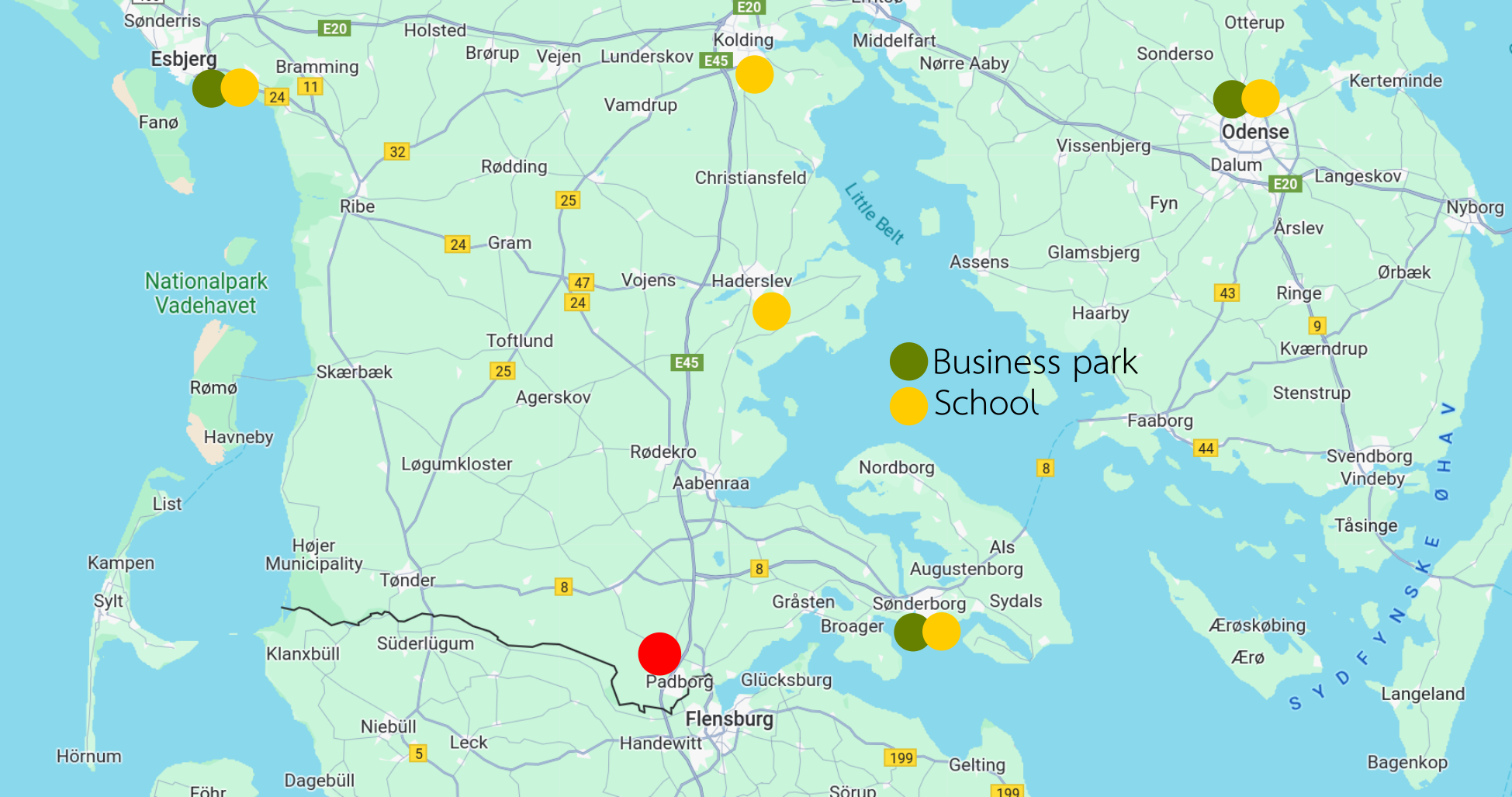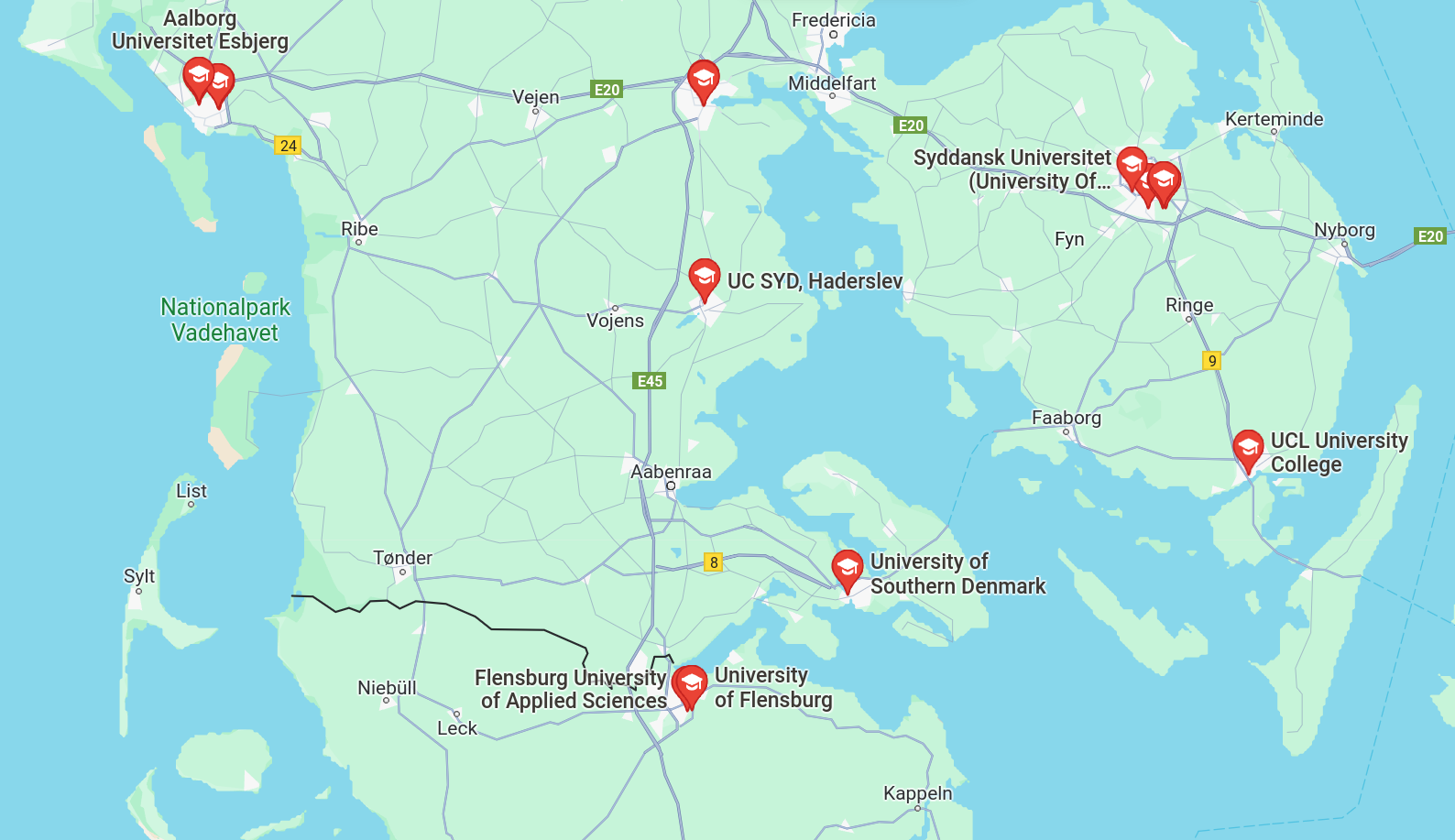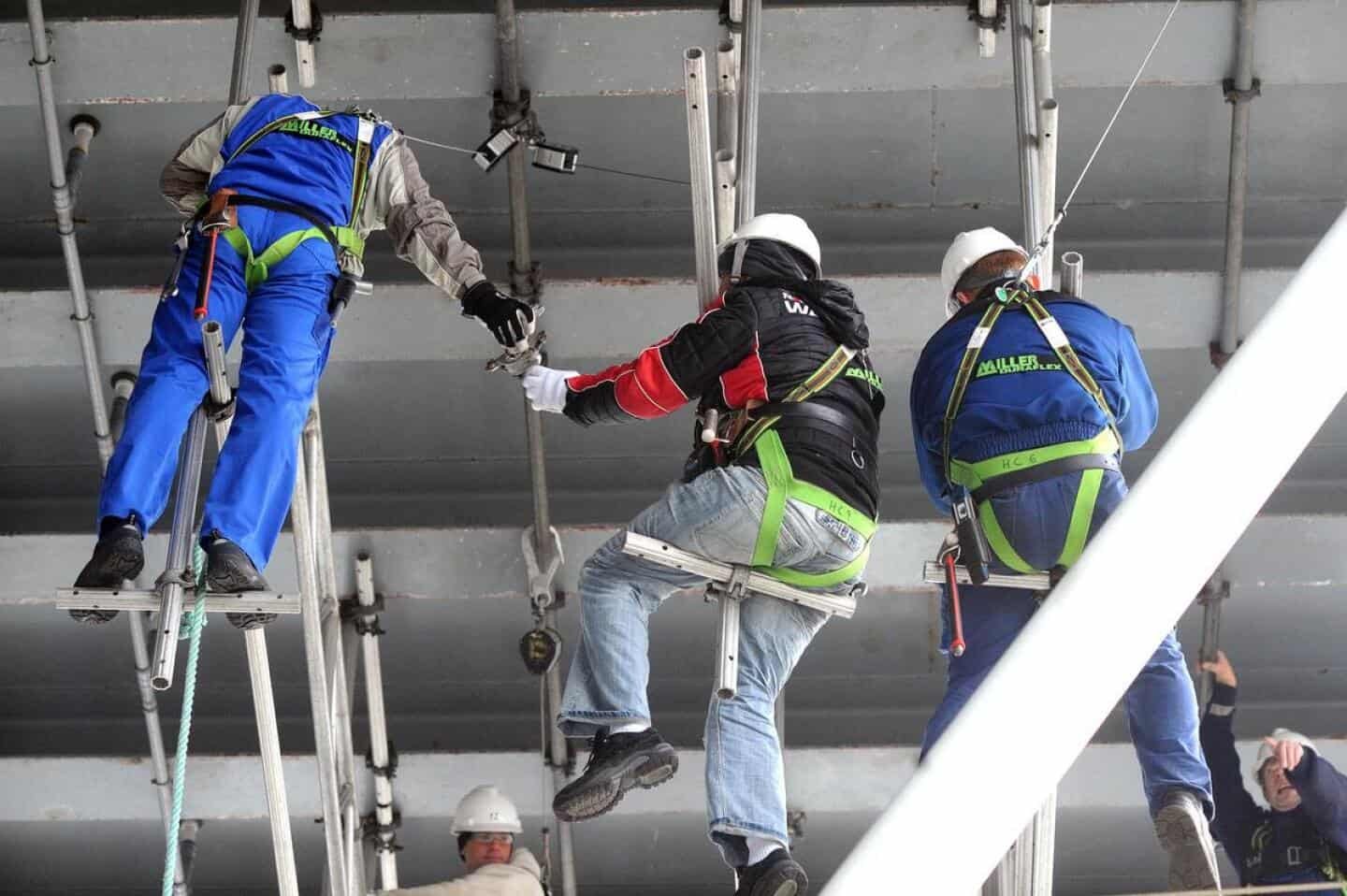Workforce and education in Southern Jutland
Cultivating talent and innovation
Introduction
Southern Jutland, a dynamic region in southern Denmark, not only boasts robust infrastructure but it also stands as a testament to the power of a forward-thinking approach to education and workforce development.
Here, a unique blend of academic rigor, industry collaboration, and a commitment to lifelong learning fosters a skilled and adaptable workforce that fuels innovation, particularly in the fields of logistics, business, and technology. This propels regional development.
This article explores the educational landscape of Southern Jutland, highlighting the local institutions and their pivotal role in fostering collaboration between academia and industry through internships and training programs.
The educational framework: Cultivating a foundation for success
Overview of educational institutions
Southern Jutland boasts a multi-tiered educational system that is integral to the region’s talent pipeline. This includes universities renowned for their research and innovation, applied science colleges that emphasize practical skills, and vocational schools that specialize in trades and technical training. The diverse educational ecosystem ensures a broad spectrum of skills and knowledge, meeting the varied needs of the region’s industries.
Primary and secondary schools: Forming the cornerstone of the system, primary and secondary schools lay a strong foundation in core subjects like mathematics, science, and languages. However, the curriculum extends beyond formulaic memorization, emphasizing critical thinking, problem-solving skills, and collaboration. Project-based learning approaches encourage students to tackle real-world challenges, fostering creativity and innovation. Additionally, a strong focus is placed on digital literacy, equipping students with the technological fluency increasingly demanded in the modern workplace.
Vocational training programs (erhvervsuddannelser): A hallmark of the Danish educational system, Vocational training offers a unique blend of theoretical knowledge and practical experience. Students typically spend three to four years in these programs, combining classroom instruction with extended periods of practical training embedded within companies. This dual approach ensures graduates possess not only the theoretical knowledge but also the practical skills and hands-on experience sought after by employers. The emphasis on practical training fosters a strong work ethic and industry readiness, allowing graduates to seamlessly transition into the workforce.
Higher education institutions: Universities and academies in Southern Jutland offer a spectrum of bachelor's and master's degree programs aligned with regional industry needs. These institutions prioritize applied research, with strong ties to local companies. This ensures graduates possess not only a deep theoretical understanding of their chosen field but also the practical skills and industry knowledge required to make immediate contributions upon entering the workforce. Furthermore, universities actively foster a culture of innovation and entrepreneurship among students, providing them with the resources and support needed to turn their ideas into viable businesses.
Spotlight on key institutions
University of Southern Denmark (SDU): With a campus in Esbjerg, SDU is pivotal in driving research and higher education in Southern Jutland. The university offers a variety of programs in logistics, engineering, business management, and information technology, each designed to align with the region’s economic sectors.
Business Academy Southwest: This institution is known for its focus on applied learning, offering bachelor’s degrees and academy profession degrees in business, technology, and design. Its programs are tailored to integrate theoretical knowledge with practical application, preparing students for immediate entry into the professional world.
Esbjerg technical colleges: Specializing in vocational training, these colleges provide hands-on education in fields such as logistics, construction, design, and electronics. The colleges are essential for preparing technicians and skilled tradespeople, crucial for the operational aspects of Southern Jutland’s industries.
Integration of education and industry
Collaborative education models
A defining characteristic of Southern Jutland's educational system is the close collaboration between educational institutions and industry players. These partnerships are designed to bridge the gap between academic training and industry needs, ensuring that the curriculum remains relevant and responsive to market demands.
Internship and apprenticeships
Internships and apprenticeships are a cornerstone of the educational experience in Southern Jutland, they provide students with valuable on-the-job experience while allowing companies to identify and nurture future talent. Many local businesses, particularly those in logistics and e-commerce, offer internship programs that allow students to apply their classroom learning in a practical setting. These opportunities not only enhance student learning but also allow businesses to benefit from fresh perspectives and innovative ideas. Companies can also benefit from a readily available pool of skilled and motivated individuals who can contribute to ongoing projects while potentially transitioning into permanent positions upon graduation.
Joint research initiatives
Universities like SDU often participate in joint research initiatives with industry partners. These projects not only advance knowledge in fields such as supply chain management and digital commerce but also create avenues for students to engage in cutting-edge research, often leading to employment opportunities post-graduation.
Curriculum development
Industry insights play a crucial role in shaping the curriculum for both vocational training programs and higher education degrees. Regular consultations with industry leaders ensure that educational programs equip students with the most up-to-date skills and knowledge required in the ever-evolving job market. This adaptability ensures graduates remain competitive and prepared to address the challenges of the future.
Guest lectures and industry projects
Industry professionals are frequently invited to deliver guest lectures at educational institutions. These sessions provide students with invaluable insights into real-world applications of their studies and the inner workings of different industries. Furthermore, students often undertake real-world projects in collaboration with companies. These projects allow students to apply their theoretical knowledge to practical problems, fostering problem-solving skills, teamwork, and industry readiness. Companies benefit from the fresh perspectives and innovative ideas that students bring to the table, fostering a culture of continuous improvement.
Skills development and lifelong learning: investing in the future
To ensure its workforce remains competitive, the region prioritizes continuous skills development and lifelong learning opportunities.
Continuing education programs
Southern Jutland recognizes that the modern workplace is characterized by constant change and evolution. Due to the importance of lifelong learning, educational institutions in the region offer various continuing education programs aimed at professionals seeking to enhance their skills or pivot their careers. These programs range from evening courses in business analytics to specialized training in software development, reflecting the region’s adaptive approach to education.
Upskilling and reskilling programs
A range of upskilling and reskilling programs are offered by educational institutions, private training providers, and even companies themselves. These programs cater to the evolving needs of the workforce, equipping individuals with the latest industry-specific knowledge and skills. This ensures workers can adapt to technological advancements, emerging trends, and new job requirements, remaining valuable assets to their employers throughout their careers.
Digital skills and innovation
With the digital economy playing a pivotal role in Southern Jutland’s growth, there is a significant emphasis on developing digital skills across all levels of education. From coding workshops in primary schools to advanced AI research at the university level, Southern Jutland is committed to preparing its workforce for the future.
Impact on regional development
Economic contributions and community engagement
The synergy between Southern Jutland’s educational institutions and its workforce is a key driver of regional economic development. Skilled graduates entering the workforce help sustain and grow local businesses, contributing to the overall economic health of the region. Educational institutions in Southern Jutland also play a vital role in community engagement and development. Through public seminars, workshops, and cultural events, they help foster a community that values education, innovation, and collaboration.
Attracting international talent
The high quality of education and training in Southern Jutland attracts students and professionals from across the globe, enhancing the region’s diversity and enriching its cultural and professional landscape. This international dimension adds a global perspective to local businesses, facilitating broader market reach and cultural exchange.
Conclusion
The educational landscape in Southern Jutland is a fundamental component of the region’s success. By providing a continuous supply of skilled talent and fostering close collaboration between academia and industry, Southern Jutland not only maintains its competitive edge in logistics, business, and technology but also sets a benchmark for educational excellence and industry integration. As the region continues to evolve, its educational institutions will play an increasingly critical role in shaping a dynamic, innovative, and resilient workforce capable of leading Southern Jutland into the future.





